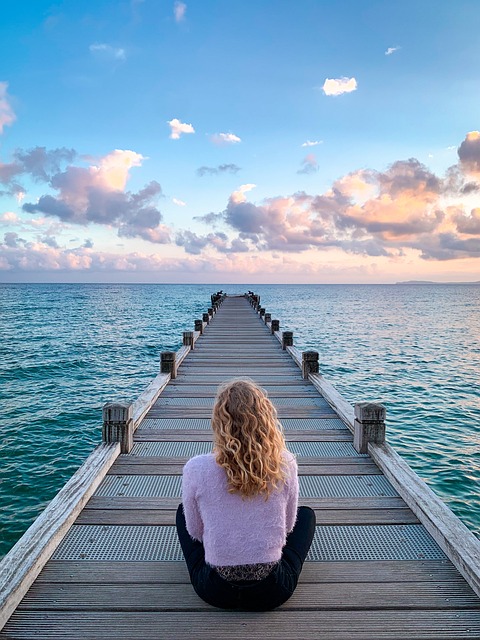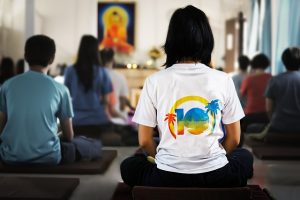 Another healthy young person committed suicide after attending a 10-day Vipassana retreat, known as a Goenke retreat, raising questions about the safety of these programs which require participants to sit in a silent meditative state for 10-11 hours a day.
Another healthy young person committed suicide after attending a 10-day Vipassana retreat, known as a Goenke retreat, raising questions about the safety of these programs which require participants to sit in a silent meditative state for 10-11 hours a day.According to the Daily Mail, the latest victim was a 22-year-old Canadian woman named Jaqui McDermott who killed herself in October of 2022 after attending a Goenka retreat. The retreats, which are popular with Silicon Valley elites, was attractive to the young artist who was described by her mother, Nathalie, as a “very spiritual person” who was already in the habit of meditating daily when she decided to sign up for the retreat.
As the Mail explains, a typical Goenka retreat starts with having one’s cell phone and car keys taken away. Retreatants are told they are not their own master for the next 10 days and must follow all of the teacher’s instructions exactly. Students are told that they cannot leave mid-retreat because the vipassana process is “like an operation of your mind. If you leave in the middle of it, it's dangerous. It's like leaving during an operation which is in the process of happening when you're cut open.”
After taking various vows together with other students on the first night, they are told they may not leave the premises, may not take walks, or even get something out of their car. No exercise is permitted. Only prescription medication can be taken during the retreat and no other spiritual practices are permitted. During the day, which typically starts at 4 AM, there is to be no talking or eye contact with anyone as they spend the next 10 hours in silent meditation. There is no dinner in the evening. Participants are made to watch tapes of the founder of the program, a Burma-born spiritual leader named S. N. Goenka (1923-2013), in the evenings with only volunteers nearby to offer assistance to retreatants.
Nathalie heard nothing from her daughter during this time and had no idea that anything was wrong until she got a phone call from the retreat staff telling her that Jaqui had left the course during the night and they couldn’t find her. After repeated attempts to reach her daughter, she called the Royal Canadian Mounted Police to file a missing person’s report.
 Her first inkling that something had gone wrong on the retreat was when a member of the retreat staff admitted that Jaqui had had an emotional few days before her disappearance.
Her first inkling that something had gone wrong on the retreat was when a member of the retreat staff admitted that Jaqui had had an emotional few days before her disappearance.
“The office admin person who had reached out to us got the assistant teacher on the phone with us, and all he basically said was she had a difficult day, she was crying. She was obviously struggling. And so we said,’so you sent her to bed?’ And he said something along the lines of, '’well, we were going to work on it tomorrow’,” Nathalie was told.
Police found Jaqui’s abandoned van parked alongside the road about 30 miles from the retreat center with no sign of Jaqui. For the next week, police launched an extensive search with volunteers, family and friends joining in the search.
Sadly, the search ended when authorities found Jaqui’s body. A coroner later determined that she took her own life.
This is just one of many horror stories that have surfaced from inside these retreats where people are subjected to unnatural meditative practices that entail long hours of sitting in silence, focusing the mind on the sensations of the body and learning how not to react to them.
This site describes the practice of Vipassana as, “a mental training. Just as we use physical exercises to improve our bodily health, Vipassana can be used to develop a healthy mind.”
They go on to explain the three steps to vipassana meditation. The first step is to refrain from killing, stealing, sexual activity, speaking falsely, and intoxicants. “This simple code of moral conduct serves to calm the mind, which otherwise would be too agitated to perform the task of self-observation,” the site explains.
“The next step is to develop some mastery over the mind by learning to fix one's attention on the natural reality of the ever-changing flow of breath as it enters and leaves the nostrils. By the fourth day the mind is calmer and more focused, better able to undertake the practice of Vipassana by observing sensations throughout the body, understanding their nature, and developing equanimity by learning not to react to them. Finally, on the last full day participants learn the meditation of loving kindness or goodwill towards all, in which the purity developed during the course is shared with all beings.”
 For reasons that should be obvious at this point, Goenka retreats have been criticized not just for their austerity, but for the way the retreats are run. Unlike other meditation centers that offer shorter courses for people who are not experienced in meditation to be sure they can handle it, Goenka retreats require an initial 10-day course. Also, because these retreats tend to be free of charge and are funded by donations, this can result in volunteers who don’t have the qualifications to help anyone who might encounter problems during the retreat.
For reasons that should be obvious at this point, Goenka retreats have been criticized not just for their austerity, but for the way the retreats are run. Unlike other meditation centers that offer shorter courses for people who are not experienced in meditation to be sure they can handle it, Goenka retreats require an initial 10-day course. Also, because these retreats tend to be free of charge and are funded by donations, this can result in volunteers who don’t have the qualifications to help anyone who might encounter problems during the retreat.
History has shown that there are plenty of serious problems that can occur when people sit in this empty state of mind for sometimes 12 hours a day for 10 days. Does it help the mind, or break the mind? In too many cases, it’s the latter.
This was certainly the case with 25 year-old Megan Vogt who committed suicide in 2017 by jumping off a bridge after attending a Goenka retreat.
When she signed up for the course, she was her usual happy self, but ten days later, someone from the center called her parents to say they needed to come and get Megan because she was “confused” and in no condition to drive. The family found her in an incoherent state, refusing to make eye contact with them and repeatedly telling them they were “just a projection” and not really there. On the way home, she tried to commit suicide by throwing herself out of the car. They drove her straight to a hospital that had a psychiatric ward and although she seemed to make progress during her stay, she was never herself again.
Ten weeks after the retreat, she leaped from the Norman Wood Bridge, falling 120 feet to her death.
"Please forgive me for doing this," she wrote in a final note to her boyfriend, Brian Dorsey, that was jotted on a piece of mail. "I remember what I did at the retreat. I finally got that memory. I can't live with me."
These sometimes deadly reactions to eastern meditation are not as rare as people might think. The only reason we don’t hear about them is that few researchers have looked into the prevalence of negative reactions to eastern meditation techniques.
The exception is Willoughby Britton, Director of the clinical and affective neuroscience laboratory at Brown University, who runs a support group known as Cheetah House for people who suffered psychological or physical crises because of their meditation practice. Britton recently published the largest ever study on meditation-related problems. She interviewed 100 meditation teachers and other meditators who had personal knowledge of these adverse effects.
The most common symptoms include hyper-arousal such as increases in anxiety, fear, panic, insomnia, trauma flashbacks, and emotional instability. There is also sensory hypersensitivity to light and sound. People report feeling as if they’re outside of their body, can’t feel their body, or have no body at all. Others say they experienced a loss of emotion beyond what they wanted as well as a loss of motivation or enjoyment of things.
Regardless of how hip and trendy the culture likes to present Eastern Meditation techniques, it has a very dark side that must be considered before engaging in these practices.
If you know of anyone who needs help after engaging in this, or any other kind of mid-blanking prayer, contact Cheetah House for assistance.
© All Rights Reserved, Living His Life Abundantly®/Women of Grace® http://www.womenofgrace.com
Send your New Age questions to newage@womenofgrace.com
